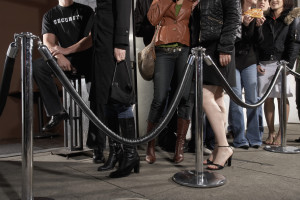 Bars and nightclubs often employ security staff to oversee property access-control, prevent violence and protect patrons. These duties place nightclub security in potentially violent situations, giving security staff the opportunity to either escalate or deter violence.
Bars and nightclubs often employ security staff to oversee property access-control, prevent violence and protect patrons. These duties place nightclub security in potentially violent situations, giving security staff the opportunity to either escalate or deter violence.
The Global Campaign for Violence Prevention explores how proper nightclub security training programs may prevent violence:
Global Nightclub Violence Interventions
In several countries, training programs have been developed to provide door staff with the necessary skills to perform their role. Such programs aim to raise awareness among door staff of how their own actions impact on customer behavior and to develop skills in customer relations and management. Components of training programs can include: conflict management (including deescalation techniques); appropriate searching methods; drug and alcohol awareness; civil and criminal law; health and safety at work; and emergency evacuation management. In Canada, the Safer Bars program…aimed to reduce aggression in bars in Toronto through the provision of training for bar owners and staff. The program showed a significant effect in reducing severe and moderate aggression in bars….
In the UK, use of door staff is often a condition of bar and nightclub licensing and basic door staff training is a requirement of employment….Now all door staff working in England and Wales must hold a licence issued by the National Security Industry Authority. Individuals with previous convictions for offenses such as violence and drug dealing are excluded, and all license holders must have undertaken training. Furthermore, in a predominantly male profession, women are being encouraged to train as door staff with free training for female door staff having been provided in London by the Security Industry Authority….
In the absence of similar legislation in New Zealand, a voluntary code of conduct and a training programme has been established by the New Zealand Security Association (NZSA). The NZSA was created to promote professionalism in the security industry, set minimum standards for its members, and develop and provide training….
In Sweden…the STAD project incorporated door staff training into wider measures to create a safer nightlife environment in Stockholm, such as the provision of late night transport. The evaluation found a 29% reduction in violent crime following implementation of the project.
In the UK, communication between door staff and other agencies working in nightlife has been increased in many areas through the development of Pubwatch schemes. These schemes bring together staff in bars and nightclubs, police and other agencies…within local areas and typically include the establishment of a dedicated radio network between members and a banning system to prevent persistent troublemakers from using bars and nightclubs.
There Future
The rapid expansion of nightlife environments in many countries and corresponding increases in alcohol-related problems such as violence has meant that the need for security in nightlife has increased. Huge demands can be placed on limited police resources during busy nightlife periods, and with door staff often outnumbering police in nightlife areas, their role in violence prevention is one that should be recognised and strengthened. By its very nature, the role of door staff means they are frequently placed in aggressive situations and without appropriate training and management, door staff may not only be ineffective at preventing violence but may actually act as a contributing factor. However, research has shown that door staff training programs can be effective in giving individuals the skills they require to carry out their role and in preventing violence. Further, registration schemes can give authorities the power to prevent those with histories of violence and other criminal activity from working as door staff, and to require training as a condition of employment. Local police, licensing officials and other agencies should work with door staff to ensure the added resource they can bring to maintaining safety and reducing violence in the night time environment is utilized to its full potential.
Read full report here.
The Murray Law Firm protects victims of nightclub security negligence and urges nightclub owners to implement proper security training programs to protect patrons. According to GCVP guidelines, security training may include: conflict management (including deescalation techniques); appropriate searching methods; drug and alcohol awareness; civil and criminal law; health and safety at work; and emergency evacuation management.
We’ve Recovered Millions for Victims of Nightclub Security Negligence…Contact us Now for a Free Consultation.
The Murray Law Firm has extensive and successful experience in representing victims of nightclub security negligence and we offer our legal expertise, if desired. We typically represent our Clients on a contingency agreement, which generally means that no fees or payments are owed until and unless we recover. Anyone seeking further information or legal representation is encouraged to contact us via e-mail (click here) or call at 888.842.1616. Consultations are free and confidential.
 The Legal Herald
The Legal Herald


